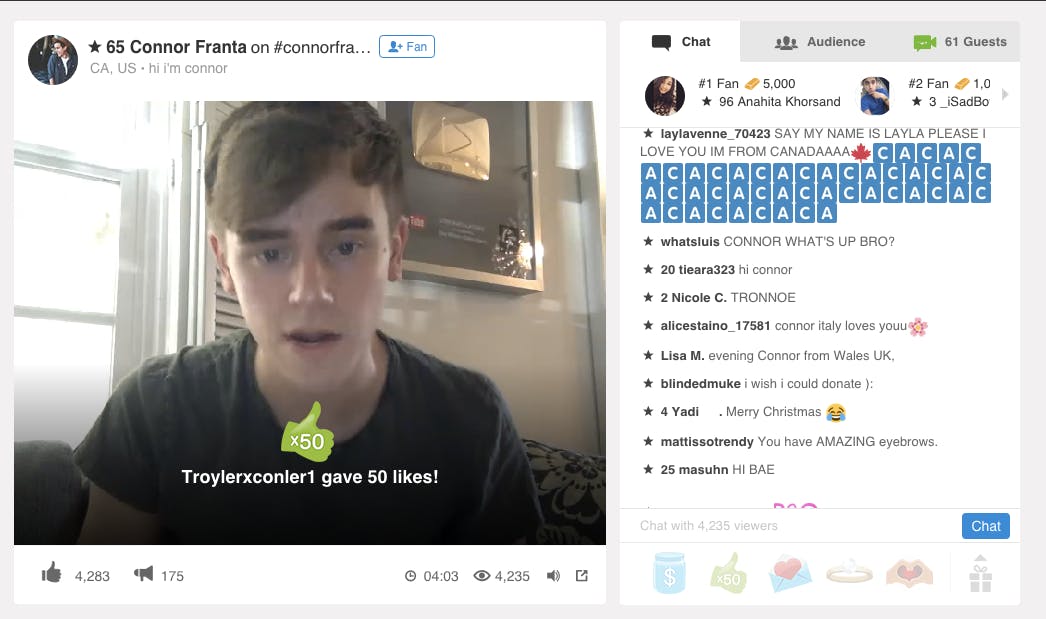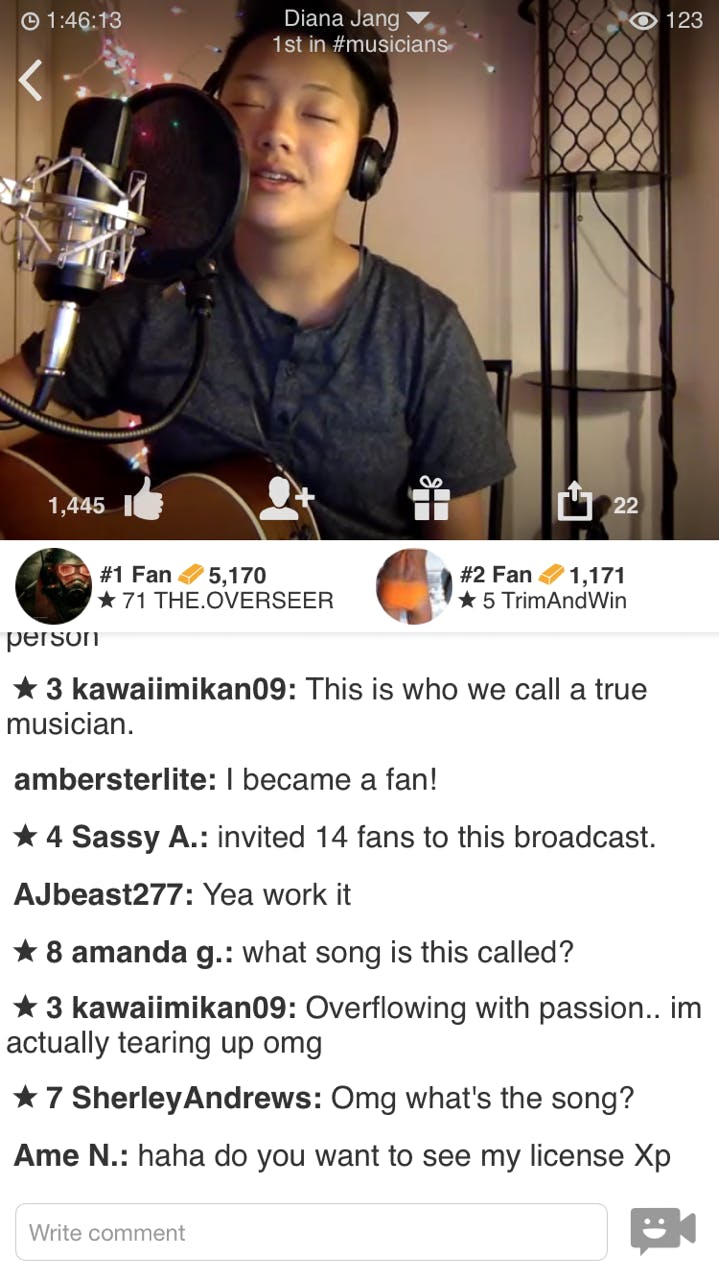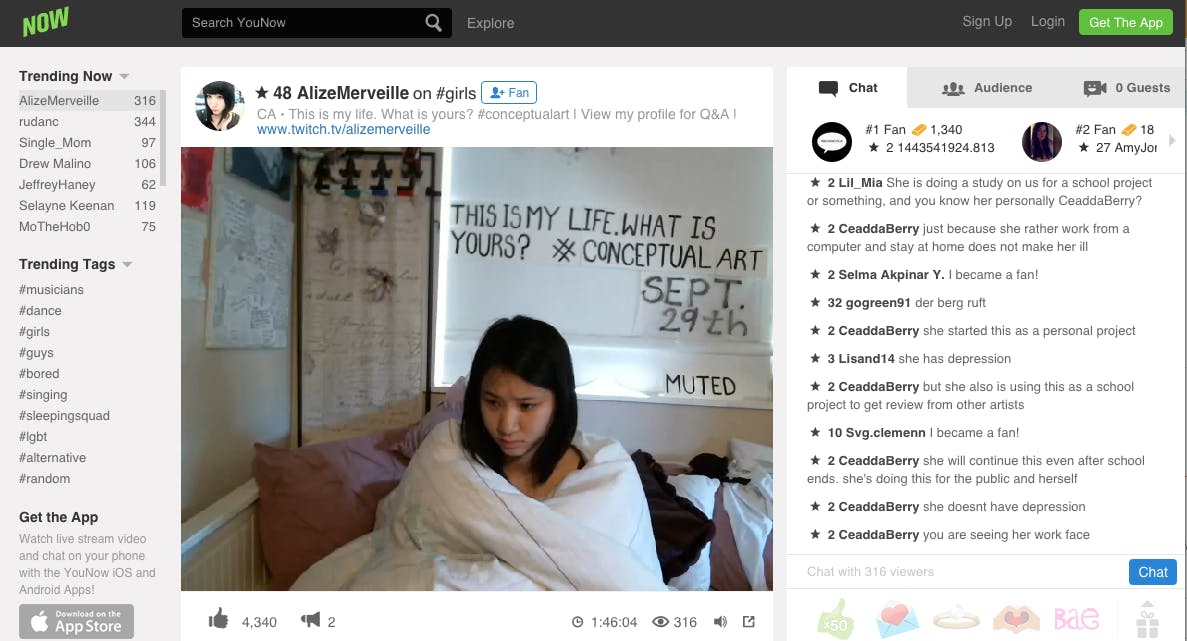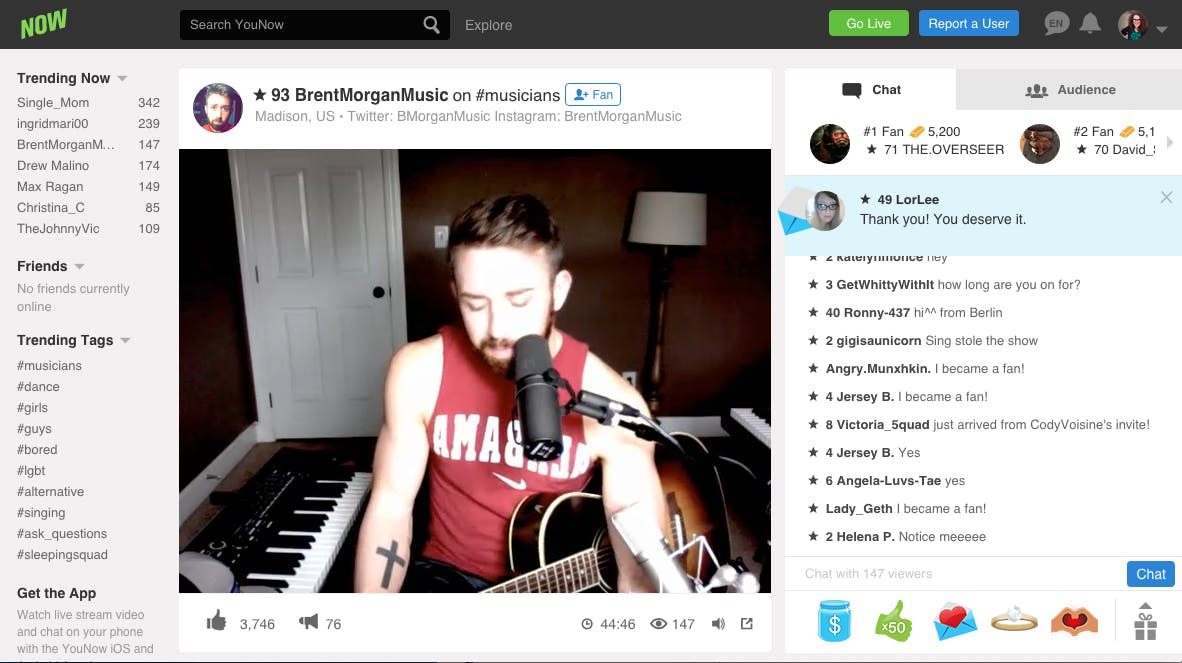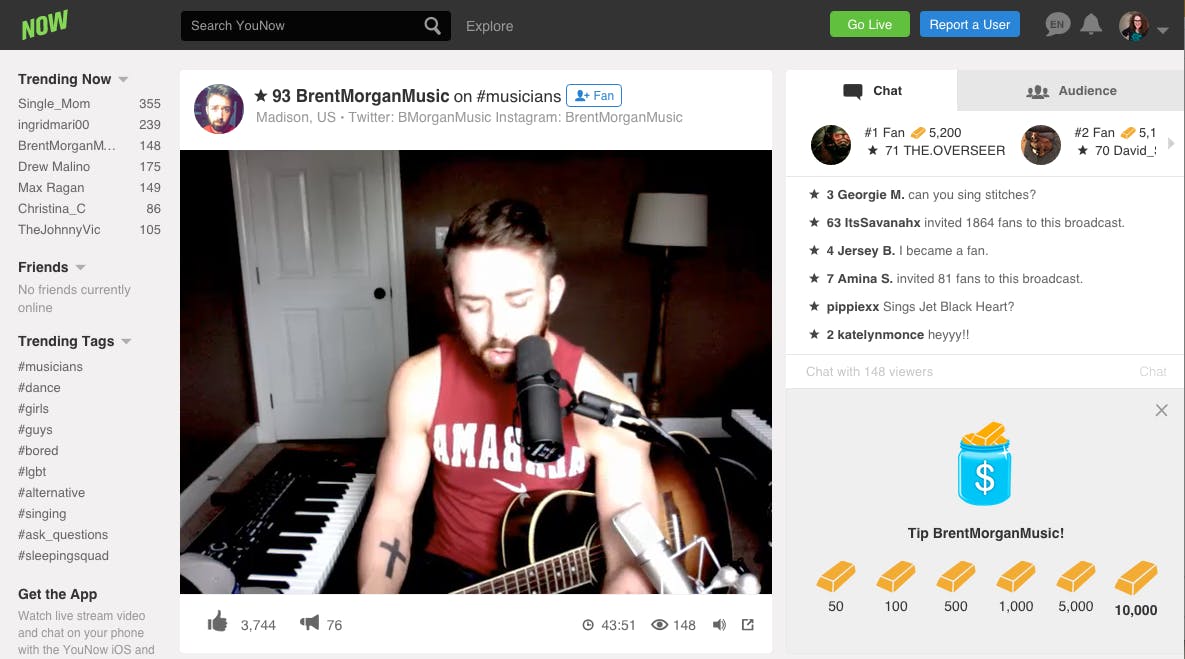Mainstream media is just starting to get a grasp on digital heavyweights like YouTube and Vine, but the next budding class of creators is already finding itself a new digital home on YouNow.
The four-year-old platform now boasts 100 million user sessions per month, broadcasts 150,000 unique livestreams each day, and recently closed a new $15 million financing round. Users are spending an average of 50 minutes per day engaged in those broadcasts, primarily on the mobile experience. It’s livestreaming, organized through topical tags that give you some idea of what you might expect to find there, with a queue of interested creators waiting for a turn in the No. 1 spot, but broadcasting to their dedicated fans while they wait. At any moment you can find a singer-songwriter singing thanks for the tips he’s receiving, a flourishing goth and emo scene in the #alternative tag, or a young woman doing a conceptual art performance of a muted view on her everyday life while fans debate if she’s depressed or not in the sidebar.
YouNow is as vast as the PG-13 Internet, and it’s growing with a user base that clamours for even more access, connection, and—the golden ticket in digital entertainment—authenticity from its idols.
Like other social platforms, there’s minimal barrier to entry. Anyone with a webcam and an Internet connection can start up on YouNow. You log in (using Facebook, Twitter, or an email address), click Go Live, and pick a hashtag to broadcast under. That’s it. The keys to building a name for yourself on YouNow are consistency and engagement. You start getting viewers, they like your broadcast, and you move up the queue until you’re taking the main spot for the hashtag at that moment. If you come back and do it again (and again and again), you can start amassing a fanbase that will take you to the top of your chosen hashtag, time and time again.
“Every day I try and perform once on #singing, and then #girls once a day to do whatever,” explained Emma McGann, a British musician who recently released a song and music video all about her YouNow fandom. “Maybe I’m making dinner or taking my puppy for a walk. They want to kind of see what happens in your day; that’s why they’re hanging around there.”
On mobile—where the majority of YouNow’s action is taking place, ever since the company released new apps last summer and watched its users skyrocket—is a sleek vertical viewing platform that melds video and commenting together, as well as YouNow’s vast gift-giving economy.
This was on display at a Variety Entertainment and Technology Summit in September, where Adi Sideman, YouNow’s founder, wowed a room of adults by logging into a live session and getting the broadcaster, musician Brent Morgan, to sing happy birthday to a woman in the audience. Morgan even instructed his followers to write “Happy birthday, Danielle” in the chat, resulting in the screen flooding with messages for a woman none of the viewers knew, sitting in a ballroom in Los Angeles.
Anyone with a webcam and an Internet connection can start up on YouNow.
The power of livestreaming in 2015 is evident, with services like Periscope and Meerkat taking center stage in the mobile space. The difference is YouNow has built both a sense of community around its broadcasters and a way for fans to fiscally and emotionally reward their homegrown stars.
“The promise of interactive television has been with us for decades now,” Sideman told the crowd. “This is yet another type of interactive TV experience. Interaction, in this case, is very satisfying. You’re getting a response that’s immediate and emotional.”
It’s also a community that, while heavily teen, touches all sorts of demographics. Recently on the #ask_questions hashtag, a graying preacher answered religious questions from a crowd; then there are users like Ted Surette, a tattoo artist and disabled veteran who regularly streams. That kind of inclusiveness makes logging on for the first time less daunting than an attempt to break into YouTube (not to mention the lack of editing or staging skills needed to get started).
My first outing, on a friend’s channel, involved us randomly describing the pictures on his TV’s screen saver and me eating a pie straight from a tin. I didn’t have to worry about if it looked perfect or if our content would stand the test of time. It was immediate, and if people liked it in that moment, they could give me a thumbs up.
But some of YouTube and Vine’s established talent are jumping on YouNow as another way to communicate with followers, too. Some turn to YouNow as a way to directly address fans when faced with controversy, like Vine star Carter Reynolds did during his nude video leak and sexual harassment allegations earlier. Others use it in a more positive vein, like Connor Franta, who helped bolster fundraising efforts for his charity projects with his 4.9 million fans, most recently raising an additional $10,000 during a live chat.
“There’s something with the live element that really encourages people to band together,” said Franta, who admitted he’s outside the YouNow bubble. “I feel like there’s a real community in there that I’m not tapped into yet.”
At its best, YouNow works in tandem with one’s entire social media presence. Users build up fans internally on the site, but they can also push updates to other social networks to let people know they’re broadcasting at that moment. The more committed fans show up to your stream and vote you up, the faster you rise in rank and show up as the top stream on a particular hashtag. Streamers and fans aren’t beholden to hashtags and can jump from one to the other throughout the day, but status follows.
“On YouNow, the homegrown stars spend an hour every evening with their audience every day,” explained Yonatan Sela, YouNow’s director of product and growth strategy. “The level of engagement that these guys are getting is insane.”
For broadcasters, being active on the site means allowing fans to interact with you in intimate ways, from streaming from home or during trips out and about via the mobile app, with none of the editing other social media celebs like YouTubers or Viners enjoy. McGann’s family calls it “big brother” when she starts streaming around them.
“I was talking to my boyfriend about it earlier, about how used to it you get,” she explained. “It just becomes your comfort zone in a way. We were walking down the street earlier and we were broadcasting, and there were people watching us, like, ‘What are they doing?’ I kind of like that! It makes you this mysterious person.”
It also can make you a rich person—or at least rich enough to make your living simply from live broadcasts. In addition to being able to purchase stickers and private messages with in-app currency and status, fans can use money to purchase “bars” in packs, and tip their favorite performers throughout a broadcast, earning shout-outs in turn. YouNow stars who’ve made a name for themselves can join its Partner Program, which entitles them to a cut of the proceeds from the sale of this digital currency that gets spent on their broadcasts.
“Video takes time, it takes attention, it takes talent,” Sideman said. “We want to make sure those who are making good, quality, live, interactive content are finding the time because they’re earning. The audience is directly responsible for this.”
Morgan said he went from novice to full-time YouNower in eight months, giving up the private guitar lessons that previously supported him after just four months on the site. “YouNow completely supports my life,” he said.
“You can’t go into a broadcast to expect to make a ton of money, but you can make fans, and eventually that can turn into money,” Morgan explained. “It’s not like a normal job. When I explained to my wife I was going to quit everything else she said, ‘That’s a little weird.’ Now she’s like, ‘oh my gosh you made the right decision.’”
Not every form of payment is in bars, however. Support can come more directly, in the form of physical gifts from followers. One fan treated Morgan’s whole family to a day at Legoland, and others have sent presents to his home.
“I got a $2,500 keyboard for my studio, a $3,000 camera to shoot videos,” Morgan said, cataloging big-ticket gifts. “These are things we never specifically asked for, but these people see stuff. One time I said, ‘my iPad is about to die.’ It was just the battery, and one of my biggest fans, her name is Mama Rachel, she sent me a brand new, fully loaded iPad. She thought it was about to break, but it just needed to be plugged in!”
Morgan said he went from novice to full-time YouNower in eight months.
Mama Rachel is Rachel Schroyer, 32-year-old Las Vegas mom who found the site thanks to her now-16-year-old daughter. She said the lure of ranking as the top fan in a broadcast, an honor measured by the amount of bars one spends, encourages fans like her to keep their tips high.
“I don’t know how much I’ve spent on YouNow,” Schroyer admits. “I feel like in the beginning, I feel like I spent so much. It’s so crazy to think about how many bars I spent! I usually have a budget now so every payday I give myself a bar allowance that I try to stick to.”
Bars come at various levels, with Rocket being the highest and most economical for the big spenders. For $49.99 you can get 6,500 bars, pricing each at less than a cent. A “Fan Mail,” guaranteed access to the streamer, only costs 40 bars, while a “Marriage Proposal” is only 25 bars. At those bargain rates, the bars can last a while, but with multiple broadcasters to support for a fan like Schroyer, you have to be strategic.
“That is how you get a broadcaster’s attention,” she said.
It’s common for broadcasters to shout out 1,000-bar tips, and the max out for a tip at a single time is 10,000 bars, or $76, which Morgan said is a pretty good single broadcast for most users. However fans can tip multiple times in a broadcast, and he’s seen much higher payouts.
“This lady had tipped me about 180,000 bars in a broadcast one time,” he gushed. “What had worried me at the beginning was we had kids stealing their mom’s credit cards and stuff, and that’s a big deal because it had to be refunded.”
YouNow has cracked down on illegal spending, and that’s kept more cash in broadcasters’, and the site’s, pockets. Morgan stays in touch with his biggest supporters, like Schroyer, going as far as to give them his home number.
“It helps me to know who they are,” he said. “The other day was our biggest broadcast, we had almost 400,000 bars. That’s a life-changer. These people were spending 400,000 bars on me.”
With fan-funded cash pouring in, brands are starting to make plays in the space as well. McGann said she’s been approached by one brand so far, a far cry from the intense saturation of brand deals on other platforms like YouTube and Vine. She turned it down because she “didn’t get what they were doing.” With platforms like YouTube and Vine now flush with creators with years of content and fans supporting their deals, those spaces are now more difficult—but not impossible—to break into as a new voice. At VidCon this summer, founder Hank Green urged content creators to look at the new platforms like YouNow as he and his ilk looked at YouTube in 2007.
“These are platforms people need to be obsessed with,” he said from the stage at the Creator Track keynote. “What’s interesting, what’s different, and how can I create for that platform with content that is specifically for that place? You gotta be obsessed by the thing that everybody else is thinking is dumb.”
“I’m more of a YouNower,” explained Makayla White, a teen who attended VidCon as part of the inaugural Creator Track. “I picked YouNow because I have a lot of friends that are on the Internet, and it lets me connect with them. It allows my personality to show, and we just have more fun that way. It’s more immediate. There’s no editing; it’s just me.”
For those rising in the ranks on YouNow, they agree that the site allows them to just be themselves, albeit a more confident version, thanks to all the exposure and support.
“YouNow has made me a completely opposite person,” Morgan said. “I used to be nervous to talk to one person, now I am talking to 1,100 people at a time. I love these people who come in my broadcast and say, ‘I’m so shy, I don’t think I’ll ever broadcast.’ I’ll stop songs and give a whole speech. Why not broadcast? It changes everything.”
Correction 2:20pm CT, Oct. 6: An early version of this story inadvertently misspelled Adi Sideman’s first name.
Illustration by Max Fleishman


